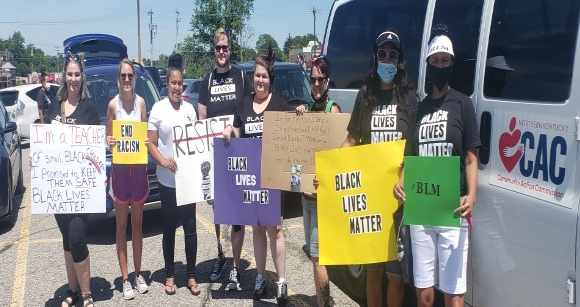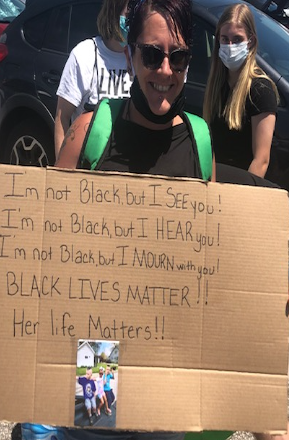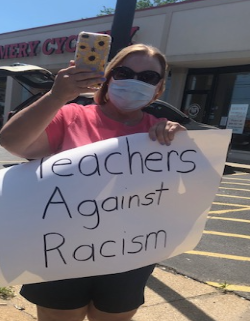Part of a series by NKY’s nonprofits who stand together against racism and any acts that dehumanize people.
By Catrena Bowman-Thomas and Rhonda Chisenhall
NKY Community Action Commission
Community Action Agencies were formed as a part of President Johnson’s War On Poverty. The Economic Opportunity Act of 1964 was created “to eliminate the paradox of poverty on the midst of plenty in this nation by opening…. To everyone… the opportunity for education and training, the opportunity to work, and the opportunity to live in decency and dignity.”
This Act authorized the formation of local community action agencies to give local communities the power to make decisions in their community to fight the war on poverty. In many communities, those living in poverty included black families. The Civil Rights Act and the formation of Community Action Agencies were intended to create equality for all, providing equal opportunities for families living in poverty, and to help lift those families out of poverty. While great strides have been made since the 1960’s, we still have a long way to go to see true equality for all.

CAC staff at the recent Peace Rally in NKY (Photos provided)
Community Action Agencies give a voice to the voiceless. They enable those living in poverty to participate in creating solutions and forming pathways out of poverty for the underserved in the community. Equal rights for all is the foundation for Community Action Agencies, and in the current climate, that focus needs to be on equality for every family in our community.
The civil rights bill that became part of the Economic Opportunity Act of 1964 was originally created by President Kennedy before his assassination. Kennedy’s civil rights bill included provisions to ban discrimination in public accommodations and to enable the U.S. Attorney General to join in lawsuits against state governments which operated segregated school systems, among other provisions.
However, it did not include a number of provisions deemed essential by civil rights leaders, including protection against police brutality. Current events are showing us that these issues still need to be tackled. Now is the time for action to stop these injustices.
One memory that will always be etched into my mind is when I first came to NKCAC two years ago. I walked into the first leadership meeting and immediately noticed I was the only person of color in the room. There were about 20 people in the room and all eyes were on me as the new executive director. I was already nervous to meet my team for the first time, but the lack of diversity immediately increased the nerves and the pressure.

In my previous position at the Community Action in Lexington, the leadership team was very diverse. This was completely new territory for me. My background and experiences are completely different from everyone in the room. As the leader it’s my responsibility to connect with them, not the other way around, so we started on our journey of teaching each other and connecting on our common cause of working with families and communities to help them thrive.
Equity and inclusion are part of my core beliefs, these are foundational principles for the Community Action Movement which was born out of the war on poverty and the civil rights movements of the 1960’s. Building upon these principles one of my first initiatives was to begin to diversify the staff, as positions became opened, we were very intentional about recruiting diverse people. We wanted the leadership to be reflective of the families we serve. Everyone I talked to said we wouldn’t be able to find a diverse pool of candidates, but it wasn’t an option. We were determined to be strategic and find the people we were seeking. Our leadership team is now 30% diverse, we did this together.
When the killings of George Floyd and Breonna Taylor caused an outcry for equality and people took to the streets demanding justice. I along with many staff participated in peaceful protests to show our solidarity with the movement for equality. We knew we had to open opportunities for staff to have real conversations about how this is impacting them and their families. We have formed small groups of staff that volunteered to participate in having deeper conversations about race, equality and how we can improve in these areas as an organization. We are using the My Black is Beautiful “The Talk” Guide created by P&G. This is a tool to help people to begin having conversations about race and equity in a safe environment.

Our board adopted an equity, inclusion and diversity statement in 2019 and we continue to monitor our progress toward equity by using the Awake, to Woke to Work: Building a race equity culture for non-profit organizations created by Equity in the Center, a project by ProInspire.
The road to equity is long and daunting. It can seem overwhelming at times, but a famous Chinese Philosopher Lao Tzu states, “The journey of a thousand miles begins with a single step.”
We must begin one step at a time, one conversation at a time. It begins around the dinner table, letting your family and friends know you stand against racism and what that looks like for your family.
It’s having the difficult conversations with co-workers when it’s easier to say nothing.
It’s holding legislators accountable for policies and practices that will make our communities and society more equitable.
It’s taking the first step.
Our organization has taken that first step. Won’t you join us?
Catrena Bowman-Thomas is executive director of the NKY Community Action Commission and Rhonda Chisenhall is VP Community Development.
















